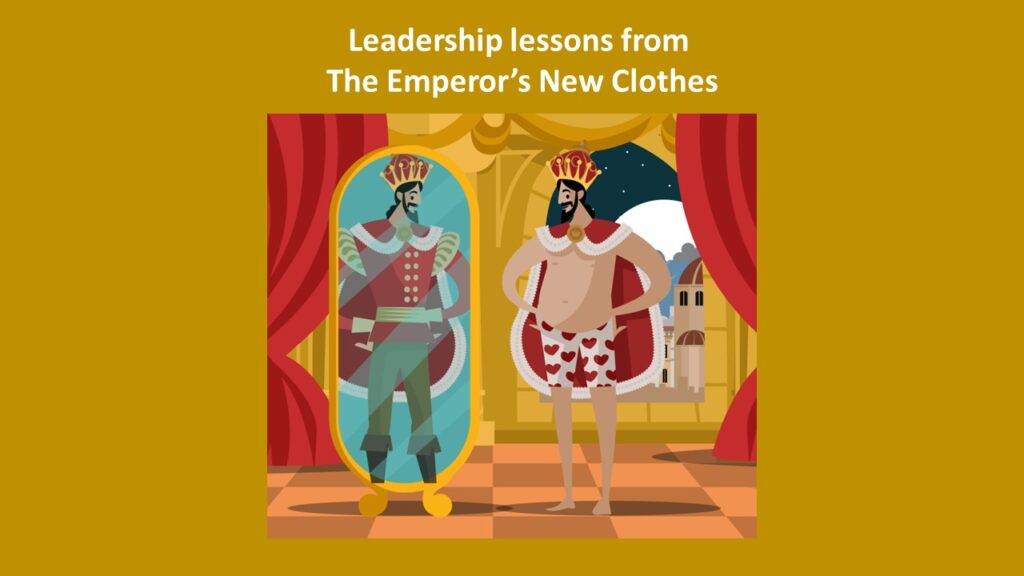
By Thomas Davis, DNAP, MAE, CRNA
Born in Denmark in the early 1800’s, Hans Christian Anderson was a prolific writer best known for his fairy tales. Among his famous fables, The Emperor’s New Clothes is a classic story that continues to be referenced two centuries later when the reality that we experience does not align with what we are told is “the truth”.
In the story, two con men implement a plan to cheat a prideful emperor by manipulating his ego. The men pretend to be weavers who have developed an amazing fabric that is invisible to those with a simple mind or unfit for their job. Eager to have the best clothes ever made, the king was captivated by the ruse and hired the men to weave the fabric and make the clothes. The men went to work pretending to weave fabric and make the clothing. At intervals the emperor would send staff members to check on the progress and, knowing that only simpletons unfit for their position could not see the fabric, they reported that it was the most beautiful material ever made. Finally, the tailors dressed the emperor in fake clothing and his staff marveled at the elegance of the new clothes. Wanting to show off, the emperor paraded through the streets where everyone applauded and admired the beauty of the clothes…until a child called out…” but the emperor has on no clothing at all”. Once the words were spoken, everyone, including the emperor, knew that they had been deceived and the embarrassed leader quickly returned home wearing only his underwear.
The most obvious takeaway from the story is that we must always trust what we see and experience rather than what we are told to believe by those who want to control the narrative. Entering an election year, we will have ample opportunity to compare the reality of our lives to the narrative of the politicians and determine for ourselves whether the emperor is wearing clothes.
Leadership lessons from the story
Legendary football coach Vince Lombardi once said, “Leaders aren’t born, they are made and just like anything else, they are made through hard work.” Becoming a respected leader takes effort and the story of the emperor’s new clothes contains a wealth of guidance for those who are leaders or aspire to leadership positions. Here are some takeaways from the story.
Pride comes before the fall. People aspire to leadership positions for a variety of reasons and, unfortunately, some seek power and position to boost their ego. Authoritarian leaders use a heavy hand to maintain dominance and control over a workgroup and quickly silence those who challenge or disagree with them. Workers learn very quickly to filter information and share only that which the leader wants to hear. When open and honest communication is stifled, the leader is blinded from vital information. Decision making without access to all the details ultimately results in failure.
Create the right environment. Regardless of the leadership style, creating an environment based on open and honest communication ensures that the collective wisdom of the group is combined to formulate the best answer to a challenge. Author Chris Voss notes that success is most likely when you enter a discussion with the mindset that you do not have all the information and that there is more to be learned. By being receptive and rewarding feedback, both positive and negative, colleagues openly share their knowledge and trust is built within the workgroup. When leaders value listening over telling, they are on the path to success.
Build the right team. As an Air Force officer moving up through the ranks, I made it a point to observe my leaders and question what made the good leaders good versus what made the bad leaders bad. Early in my career I observed that the worst leaders developed an inner circle of people who were most like themselves and shared the same view on most topics. In contrast, the strongest leaders knew their strengths and weaknesses and built a team of individuals who could best cover the weaknesses. Confident leaders delegate tasks and authority to those who are most skilled in that area. The best leaders created a diverse team and actively sought out contrasting opinions. A strong leader welcomes criticism and is willing to learn from mistakes.
Have realistic expectations. Grandiose ideas set the leader up for failure when they cannot deliver on promises. It takes more than imagination and good intentions to bring an idea to life. A solid plan backed by resources, both materials and human, and a realistic timeline are all required for success. In this story, the emperor foolishly believed that he could have whatever he imagined.
Learn from the Emperor
Whether you are a leader, worker or a citizen who desires to live in a just world, the lessons the emperor can be applied to your life. Exposing yourself to contrasting opinions and listening to understand rather than to rebut will reveal information that is essential for decision making. Avoid group thinking and once you have the facts, trust your instincts. Trust what you see and experience and have the courage to say it like it is.
Tom is an experienced leader, educator, author, and requested speaker. Click here for a video introduction to Tom’s talk topics.